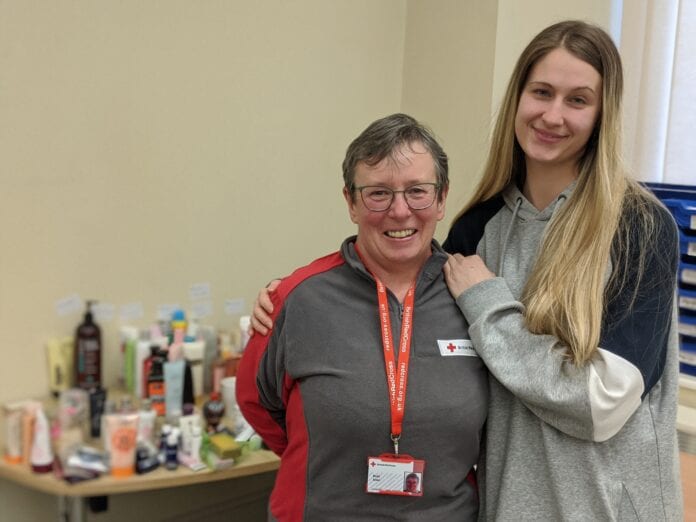Climate change disasters are killing people and devastating lives and livelihoods. Right now, extreme storms are impacting people in Vietnam and Central America. While the COVID-19 crisis has shown the realities of how vulnerable the world can be, the climate crisis is and will continue to have much more significant impact according to a new IFRC International Disasters Report: “Come Heat Or High Water: Tackling the Humanitarian Impacts of the Climate Crisis Together”.
The report found that floods affect more people than any other natural hazard.
In the UK, The British Red Cross was at the forefront of the emergency response after heavy downpours caused rivers to burst their banks in November 2019 in Yorkshire and supported people affected by Storms Ciara and Dennis earlier this year.
Communities in Wales will have a hard time forgetting the devastation caused by Storm Dennis in February 2020. Red Cross volunteers checked on vulnerable people in flood affected areas, sorted donations and manned rest centres, providing the essential services people needed to help them cope.
Emergency Response volunteer Ruth Allen travelled from Brecon to Llanhilleth in Blaenau Gwent to support at a rest centre set up by the local community for people affected by flooding. As the Red Cross team leader, Ruth oversaw a group of 10 volunteers to sort through donations at the centre and go out in the community for welfare checks in homes affected by flooding. Ruth said: “Our volunteers worked hard on the day to support those affected, getting donations organised so that local residents could come in and easily find what they needed: bedding, towels, toiletries and food. Seeing the group at work inspired a young girl in the community to become a Community Response Volunteer for the Red Cross herself to be able to support locally in emergencies.”
Roger Clarke from Thornbury was one of two British Red Cross volunteers in the South West of England who answered the call to support those affected by flooding in Llanhilleth. Roger said: “Two of us went out knocking on doors in the community, doing welfare checks, checking if people had water go through their homes, helping them understand what the rest centre was able to offer in terms of furniture and white goods. Some houses had water over a foot deep. Their settees, their tables, their carpets have all gone.
“People are very stoic about it all. What’s lovely is that the community are looking out for each other and care for each other.”
Paris Peacock of Llanhilleth was among the residents affected and supported by Red Cross volunteers at the centre. She said: “All the volunteers were incredibly kind and helpful at that difficult time. They were supportive and cheerful and I cannot thank them enough for all the hours they put in. The generosity and contributions of the public and the volunteers were a great help to us all.”
According to extensive data analysed by the Red Cross for the new IFRC International Disasters Report, over the past decade:
- In the past decade there were 2,850 disasters triggered by natural hazards, and 2,355 (83%) of these were climate and weather related. The most frequent were floods (1,298), followed by storms (589).
- Together, these disasters killed more than 410,000 people and affected a staggering 1.7 billion people.
Disasters during the first 6 months of COVID-19 in 2020:
- More than 100 disasters occurred, including drought in Southern and Eastern Africa and flooding in Bangladesh
- More than 50 million people have been affected
- More than 10 different disasters affected over 250,000 people
Today:
- Floods affect more people than any other natural hazard.147 million people may be at risk of flooding by 2030.
In the report, the Red Cross highlights that while extreme weather hazards may be natural and inevitable, disasters are not, and often happen when communities are not adequately prepared. Building resilient communities and adaptation methods will save lives and prevent harm to communities.
However, the Red Cross is concerned that the countries most affected by climate-related disasters receive only a fraction of the funding that is available to tackle the impacts of climate change.
As the world recovers from COVID-19, the Red Cross is urgently calling for global leaders to tackle climate change simultaneously, by ensuring financing is there to invest in disaster risk reduction, early warning systems and community resilience. By doing this we can reduce the human impact of natural hazards and prevent disasters before they happen.
Mike Adamson, CEO at the British Red Cross, says:
“As the world’s largest humanitarian network, we respond day in day out to extreme weather events like monsoons, typhoons, flooding and severe drought.
Behind shocking climate statistics are real people. From the family who can’t put food on the table because their crops have been washed away, to the family made homeless because their house has been destroyed. But it doesn’t have to be this way and we can stop people’s lives being devastated by the climate crisis.
‘The British Red Cross is working with communities in the UK and across the world, right now, to build resilient communities, both today and in the future. But we can’t do this alone. Ahead of COP26, the international community must scale up adaptation action now, including more investment in disaster risk reduction and being better prepared.”
From the floods in Wales after Storm Dennis in February 2020, to the flooding prone Venice of the East, Barishal in Bangladesh, we are all connected in the climate emergency.
How the Red Cross is supporting communities to adapt to climate change: Monsoons in Bangladesh
The Red Cross and Red Crescent are working with the most vulnerable communities to tackle the impacts of climate and build resilient communities. From educating communities about climate change and disaster preparedness, to helping to improve drainage systems, groups in Barishal communities have come together to tackle the climate crisis.
Josna, who lives in Barishal says flooding is a “huge problem”.
“Not only do they carry the risk of injury, but also increase the likelihood of infection and water borne diseases. The floods also affect the road network and people’s homes. We have problems eating. When there is water in the house you can’t eat. You can see the water. People are sat on top of the bed frames with dirty water on the floor.”
Josna works with a group of women in her community who address key issues affecting their lives. With the support of the Red Cross and Red Crescent, her team are focused on developing their homes against flooding and other climate disasters by improving roads, drains, wells, washrooms and toilet systems, as well as training people in disaster preparedness as cyclones and flooding are reoccurring crises which affect the region.
How the Red Cross is supporting communities to adapt to climate change: Flooding in the UK
The British Red Cross is using learnings from its international resilience and adaptation work to ramp up efforts to prevent climate disasters in the UK. Providing tool kits on how to prepare, such as storing sandbags and moving vehicles to higher ground, providing specialist training, and working with local communities to help them identify their own risks, needs and resources before, during and after emergencies, are just some of the ways the British Red Cross is better preparing communities for the impact of climate change.
With a presence in almost every country in the world, the Red Cross is committed to helping people cope with the devastating impacts of climate change, and better prepare communities for future threats. You can help continue this life-saving work by donating to the Disaster Fund https://donate.redcross.org.uk/appeal/disaster-fund
Help keep news FREE for our readers
Supporting your local community newspaper/online news outlet is crucial now more than ever. If you believe in independent journalism, then consider making a valuable contribution by making a one-time or monthly donation. We operate in rural areas where providing unbiased news can be challenging. Read More About Supporting The West Wales Chronicle
























